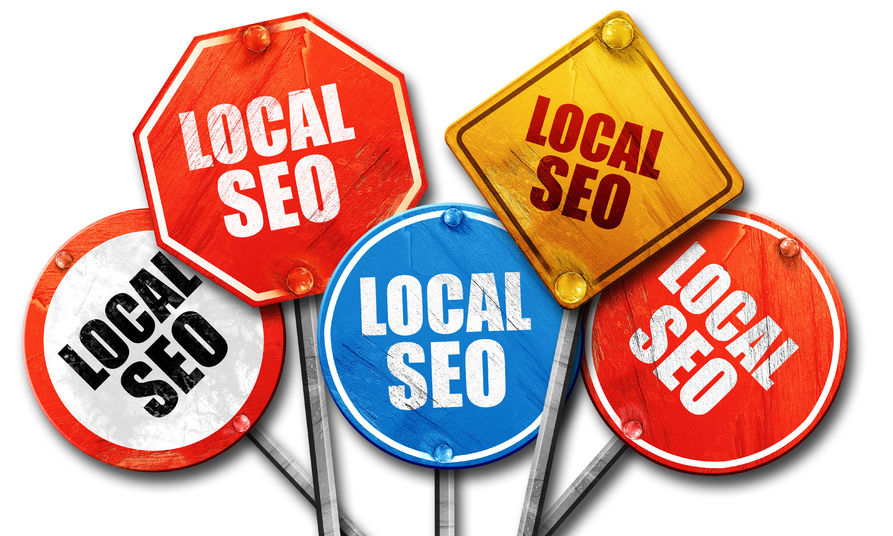I talk about local SEO tips all the time and if you’ve recently updated your local business website, you may roll your eyes at the appearance of another article about local SEO.
Believe me, I get it. I really do. And I don’t want to sound like a broken record either.
But…
The truth is that local SEO is changing all the time. It’s hard to keep up with – and I’m a professional marketer! I know it can be hard for small business owners to stay abreast of changes and keep their sites optimized for local search.
To keep things simple, I’ve put together 7 local SEO tips that will lay the foundation for your business online. I’ll focus on the quickest and easiest things you can do to ensure that your local SEO is up to date – and so the people in your target audience can find you more easily.
My Number One Local SEO Tip: Optimize Your Google My Business Listing

I’m not going to go into detail here about Google My Business because I’ve written about it extensively before. With that being said, please don’t ignore GMB in 2020. An optimized GMB listing is your best friend when it comes to local SEO.
Make sure your listing is complete and up to date. Add pictures and your company logo if you haven’t already done so and do everything you can to encourage people to review your business on Google. It’ll help BIG TIME!– I promise.
Standardize Your NAP Listings
NAP (Name, Address, Phone number) listings are another topic I’ve covered extensively, but they’ve become more important than ever before thanks to Google’s Hawk update in 2017. Having even one listing that’s not standardized can and will diminish your online presence – so don’t skip this step.
Do a Google search for your company and make sure that your NAP listing is identical everywhere it appears. Remember that even minor differences (Ave instead of Avenue) can cause a problem and reduce your search engine rankings. I know this is a painstaking, nit picky task, but it’s very important!
Specify Your Service Area
You own a local business and that means you have a service area. Even if you can technically ship anywhere, it’s still important to let potential customers know where you are.
There are two quick and simple ways to specify your service area without overhauling your entire website. You can:
- Add a bulleted list of cities, districts, or neighborhoods you serve.
- Embed a map on your site with pins in your service areas (or indicating your locations if you have more than one).
This easy step will ensure that potential customers who land on your site will be able to see at a glance whether you serve the area where they live or not.
Create Geo-Targeted Landing Pages
One of the changes included in Google Hawk is that Google made the target search areas smaller than they used to be to (at least in theory) prevent businesses from being elbowed out of search results. What I suggest is creating separate landing pages for each of your service areas. Here are some tips:
- Remember that Google ranks pages and not domain names, so there’s no limit on the number of geo-targeted landing pages you can have.
- Choose highly targeted local keywords and focus on one main keyword per page.
- Do not duplicate content too closely or Google will flag your pages as duplicate content.
- Whenever possible, link geo-targeted social proof to each page by including relevant reviews and testimonials.
Most searches these days are happening on mobile devices. Having geo-targeted pages will help you to take advantage of voice search, including “Near Me” searches that are relevant to your business.
Optimize Your Citation Pages
Did you know that it’s common for consumers to spend only a few minutes on a business website before converting? That might sound unrealistic but it’s true – and it’s because they spend far more time on citation pages before buying anything.
Some of the best-known citation pages are review aggregation sites like Yelp and Yellow Pages, but there are dozens of others – some of which are specific to certain industries.
To get a jump on optimizing your citation pages, check out this master list from Moz, which lists common citation pages by industry. Then, Google your business and make your way through each citation. Keep in mind that, in some cases, it may be worthwhile to upgrade to a premium account, so you can add images and make the most of your business listing.
Use Schema Markup on Your Website
More local SEO tips that you may have overlooked until know is Schema markup. Schema tells Google how to display your pages when they come up in search – and it can make a big difference in how local customers feel about your page.
You should use Schema markup to provide potential customers with vital information about your business. Many small businesses don’t bother to include a ‘rich snippet” with their Schema markup. You can find more information about how to use Schema markup to boost your SEO here.
Focus on Reviews

There’s no denying that social proof is the name of the game when it comes to local marketing. The research shows that almost all consumers pay at least some attention to online reviews, with many giving them as much credence as a personal recommendation.
You should start with Google My Business because those are the reviews that people are most likely to see when they search for your business. After that, you should look at review aggregation sites such as:
- Yelp
- Angie’s List
- BBB (Better Business Bureau)
- Industry-specific sites
I suggest sending an email request to your subscribers asking them to leave reviews on Google. Link directly to your review page to make it easy for them to comply with your request.
Then, make it a company policy to ask customers for reviews. You can decide what makes sense. For service providers, the best bet is probably to reach out to clients when a job has been completed. For retail, you may want to have your cashiers remind customers to leave reviews when they check out.
For extra credibility, consider linking directly to your review pages from your website. That kind of transparency is something customers value and it will help your local SEO, too!
Getting optimized for local SEO in 2020 doesn’t need to be complicated and you don’t need to spend a lot of time on these local SEO tips. The quick fixes I’ve provided here will help you fine-tune your local SEO and grow your business in 2020.
If you are too busy running your business (and who isn’t these days) to implement these important local SEO tips for your website. Or if you just want someone to do all the boring technical stuff for you, contact us today and we’ll get it done for you right.



0 Comments